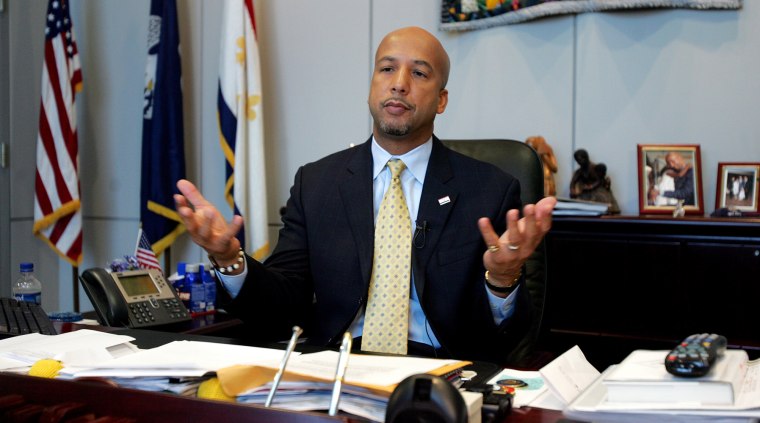Bureaucracy and a lack of money are slowing the rebuilding of New Orleans nearly a year after Hurricane Katrina hit, Mayor Ray Nagin said Monday.
As the one-year anniversary of the storm approaches on Aug. 29, the city still is struggling financially, despite billions of dollars in congressional appropriations, he said.
“The misperception out there is New Orleans is wallowing in dough and we have money coming out of our ears,” the mayor told The Associated Press.
But little of the appropriated money has reached the city, Nagin said. The city is still waiting for federal officials to approve much of the $1 billion requested for essential infrastructure, he said.
Susan Aspey, spokeswoman for the federal coordinator appointed by President Bush to oversee Gulf Coast rebuilding, said the Federal Emergency Management Agency has approved 53 percent of the $1 billion, and sent the money to Louisiana.
“The way it goes is, the state works with the city to provide the funding,” she said.
Bush on Monday, though, acknowledged the sluggish pace of aid to Louisiana. At a White House news conference, he said the government has committed $110 billion to Katrina relief and the money was taking longer to get to those who deserved it in Louisiana than in Mississippi.
Gonzales vows to send more resources
Also Monday, Attorney General Alberto Gonzales said he would send additional resources to New Orleans — including 10 assistant U.S. attorneys — to help fight fraud and a recent rise in violent crime
Four additional agents from the Bureau of Alcohol, Tobacco and Firearms and four additional deputy U.S. marshals would also be sent to work with law enforcement agencies in the metropolitan area, Gonzales said.
“When infrastructures are damaged and resources are compromised — and I’ve seen vivid evidence of that reality here in New Orleans today — it is appropriate for the federal government to come alongside a community,” Gonzales said.
Meanwhile, another 800 affordable housing units in the city’s formerly blighted projects are ready for occupancy, U.S. Housing and Urban Development Secretary Alphonso Jackson announced Monday. He said an additional 200 will be ready by the end of the month.
That would bring the number of units reopened since Katrina to 2,100; about 5,100 units were occupied before the storm.
The city has received a $120 million federal community disaster loan and $100 million to reimburse some infrastructure costs, but no aid to provide ongoing, essential services, Nagin said.
New Orleans is operating on about a quarter of its pre-Katrina revenue because of the loss of residents and businesses — even though the city’s needs have grown tenfold, Nagin said.
Several years needed, Nagin says
The delay in funding combined with questions about how levees will be rebuilt, dramatic increases in insurance rates and a shortage of contractors have “contributed to us not having as much momentum as we should,” Nagin said.
Nagin said rebuilding will likely take three to five years, and it’s not clear how soon the city might recover its pre-Katrina population of 465,000 people. Only about half of the city’s residents have returned so far.
Nagin has said the population might reach 300,000 by year’s end, even though flood waters destroyed much of the city’s housing. But further recovery could be slow.
“It’s going to depend on how momentum sets in,” he said. “I’m not sure we’re going to get to our original population in a short time frame.”
Despite this year’s relatively quiet hurricane season, the upcoming anniversary will dredge up memories and renew some fears for residents.
“It’s going to be incredibly difficult, but it’s going to be something that once we get past it, I’m hopeful people will put Katrina behind them,” Nagin said. “We’ll get about the business of doing what we have to do.”
Nagin, a political neophyte who rose to national prominence as the city was deluged by flood waters last year, says he intends to focus during the rest of his new four-year term on boosting the momentum of rebuilding.
After that, the 50-year-old said he’d like to leave politics, but he wouldn’t rule out a run for another office.
“If I see I’m needed in another role in politics, I’d have to swallow hard,” he said. “But I would be open to that.”
The mayor and his family moved back into their home in the Gentilly neighborhood Sunday, after living elsewhere in the city. “It’s not totally done, but it’s close enough,” Nagin said.
